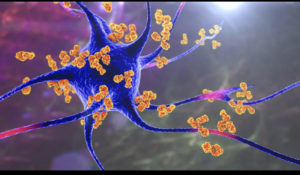This development could open new methods for the diagnosis and treatment of schizophrenia.
An antibody that targets the body’s own cells may be responsible for some cases of schizophrenia, new research suggests.
The findings suggest that an autoantibody that targets a molecule involved in brain cell communication may be an underlying cause after mice injected with it began to display schizophrenia-like symptoms.

“The results were impressive,” said lead author Hidehiko Takahashi in a statement.
“Even though the mice only had these autoantibodies in their brains for a short time, they had changes in their behavior and synapses that were similar to what you see in humans with schizophrenia. ”
Schizophrenia
Schizophrenia is a serious mental disorder in which people interpret reality in abnormal ways.
Schizophrenia can cause a combination of hallucinations, delusions, and extremely disordered thoughts and behaviors that impair daily functioning and can be disabling.
People with schizophrenia require lifelong treatment.
Research
The research was published in the journal Cell Reports Medicine.
Autoantibodies are created by the immune system and target the body’s own cells. They are implicated in a number of autoimmune diseases, such as Grave’s disease.
Previous research has implicated the neural cell adhesion protein molecule (NCAM1) in the development of schizophrenia, due to its critical role in communication between neurons in the brain.
If something were to prevent NCAM1 from doing its job, the result could look like schizophrenia.
Researchers from Tokyo Medical and Dental University (TMDU) examined around 200 control patients without schizophrenia and 200 with schizophrenia, looking for autoantibodies against NCAM1.
They found that a small, but not insignificant, number of schizophrenic patients had these autoantibodies circulating in their bodies.
“We only found these autoantibodies in 12 patients, suggesting that they may be associated with the disorder in only a small subset of schizophrenia cases,” explained Hiroki Shiwaku, lead author of the study. .
To test their hypothesis on the action of anti-NCAM1 autoantibodies, the researchers took them from schizophrenic patients and injected a purified solution into the brains of healthy mice.
Soon after, the mice began to exhibit behavioral changes consistent with symptoms of schizophrenia, as well as reduced brain structures involved in signal communication.
Together, the results suggest that these autoantibodies may play a causal role in some schizophrenic patients.
Although the number of patients with anti-NCAM1 autoantibodies appears low, schizophrenia is a complex disorder that often presents differently in each individual case.
Such conditions likely have multiple causes, and identifying each will allow scientists to develop a comprehensive set of treatments.
This development may open new ways for the diagnosis and treatment of schizophrenia, which constitute great advances in the management of a complex mental disorder.